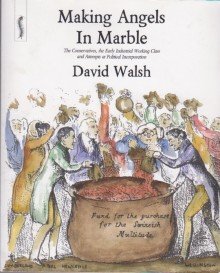The Conservatives, the Early Industrial Working Class and Attempts at Political Incorporation
David Walsh
Many working class people favour the Conservatives and thanks to their votes the Tories have traditionally formed the Government. The roots for such support is the basis for this highly informative book, which is published by Breviary, a publishing house that can be relied upon for breaking new historical ground.
Making Angels in Marble examines the industrial north-west. (of England) It asks why in the period following the passing of the 1832 Reform Act, which was the result of intense pressure by many working class supporters of political reform, that many in the industrial working class of the region supported the existing political parties — and specifically the Conservatives – even though these parties had only extended the franchise from 500,000 to 813,000 males, around one fifth of all adult males. Why was it that many working class people didn’t back militant factions such as the Chartists who argued for a much larger electorate plus reforms that included equal electoral districts and secret ballots?
The Conservatives had been strongly associated with widespread corruption — including the buying of votes. They were also strongly resistant to extending the franchise to the “Swineish multitude” as Edmund Burke famously described the working class, who had also been attacked by the passing of the Combination Acts at the end of the eighteenth century that made it illegal for workers to join together to press their employers for shorter hours or more pay. Trade unions were thus effectively made illegal.
In the first elections after the 1832 Reform Act was passed the Tory Party, with its strong links to the landed aristocracy, won just 30 percent of the vote with the Whig – the Liberals – winning 67 percent. The Tory Party seemed set to go out of existence.
The working class of the industrial north-west was mainly the result of the introduction of new technology in cotton spinning. Workmen, such as weavers, who until the 1760s still had a degree of independence, had no option except to take up regimented work in the factories or starve to death. They naturally resented a new social and ‘laissez faire’ economic system, which they likened to slavery, and the Liberals, many of them factory owners, who wholeheartedly backed it and also challenged the established church and the House of Lords.
In order to divert it away from radicalism and incorporate working class support, the Tory Party, which had previously been centrally organised, began a process of becoming a modern party by setting up local Conservative associations that were open to all and which until now have largely been dismissed by historians as unimportant or viewed as a tactical ploy by the Conservatives. Walsh demonstrates this was far from the case and across the north-west virtually every town had a Conservative Association one by 1836. Membership numbers often surpassed, even at the height of its influence, the numbers who belonged to Chartist organisation’s.
Many in the working class and in the Tory Party shared an effective illusion in the past and an imperfect system of joint rights and responsibilities. Both in a sense felt a deep sense of insecurity when faced with the rising power of entrepreneurs and the passing of the Poor Law in 1834 by the Whig Government of Earl Grey, under which relief would only be given in workhouses, added to their fears.
The Tory Party was able to garner working class support by highlighting the threat posed by Whig/Liberal policies whilst also extolling the old style Tory paternalism that meant landowners were seen as having a customary responsibility for ensuring the poor, elderly and sick were cared for.
Radical Tories such as Richard Oastler were then able to persuade workers to rely upon external leadership, instead of developing independent tactics of their own, by taking up issues such as restricting the numbers of hours that could be worked by children and women in particular. When the Whig Government refused to interfere with the free market over such issues the Tories noted that this was at odds with the Whig’s being willing to interfere, and for the worse, in matters concerning the dispensing of poor relief.
Tory paternalism was being reworked, while the working class was being included, admittedly often at a junior non-officer level, into local Conservatives Associations that, crucially, also provided some basic social support for its members at times of sickness and death.
Together, even after the Tory Party split in a battle over the Corn Laws in the late 1840s, this combination was to lead to great electoral success, particularly in the 1860s and 1870s and paving the way for the Party to retain the support of many working class people decades later. Breaking this support remains crucial if a more equal and better organised society is to be built.
David Walsh is to be congratulated for writing a fine book that breaks new historical ground. – See more at: https://www.unitetheunion.org/growing-our-union/education/bookofthemonth/january-2017/#sthash.dE5GGbJb.dpuf







